Pacifism in
the Constitution of Japan
What is the international order pursued in the Constitution of Japan?
The perception of the constitution in the context of international relations
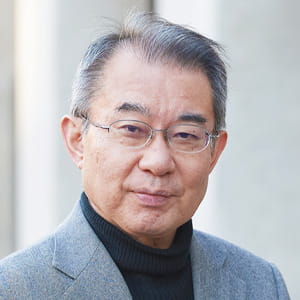
KIMIJIMA AkihikoProfessor, College of International Relations
Constitutions are created as a result of war,
so we need to see them in the context of international relations
Why is the study of the Constitution of Japan carried out in the College of International Relations?
Kimijima Constitutions should be considered in the context of international relations.
When do you think constitutions are made? Everywhere in the world, whenever a new constitution is created or an existing constitution is changed, it is basically the result of war or revolution. New constitutions are made on the values of the victor. That’s why we need to see them in the context of international relations. Constitutions can’t properly be understood without knowledge of international relations.
The same applies to the Constitution of Japan. The Constitution of Japan was the result of Japan’s defeat by the Allies in World War II. My area of expertise is constitutional pacifism. Article 9 of the Constitution was born in international relations, and its interpretation has changed as international relations have changed. We have to look at it realistically.
What is your view regarding the pacifism of the Constitution of Japan from the perspective of international relations?
Kimijima I believe that Article 9 of the Constitution should be understood in conjunction with the second paragraph of Preamble to the Constitution. The essence of Article 9 is that Japan renounces its military sovereignty. In other words, we don’t have an army, and even if we had an organization with any real strength, it has no independence, meaning it would be subordinate to some other organization. Considering the international situation at the time together with the second paragraph in the Preamble, “...trusting in the justice and faith of the peace-loving peoples of the world,” it is clear that we “decided to preserve our security and survival” by entrusting it to the United Nations. Unarmed, with security guaranteed by the United Nations. That was Japan’s starting point after the defeat.
However, after that the Cold War started between Eastern and Western countries, security by the United Nations could not be guaranteed. The Japanese government therefore concluded the 1951 Security Treaty Between the United States and Japan, which was established under the leadership of the United States and was premised on the existence of the Japan Self-Defense Forces. However, I believe that in order to preserve the idea of the Preamble and Article 9 of the Constitution, it is necessary to create something in East Asia to replace the United Nations security guarantee, which could not be realized. While the Constitution is a result of Japan’s defeat in the war, it is also the result of the actions of Japanese imperialism in East Asia. I believe that a correct interpretation of the Constitution is to work toward the creation a comprehensive security framework in East Asia that is not a military alliance, but “common security.”
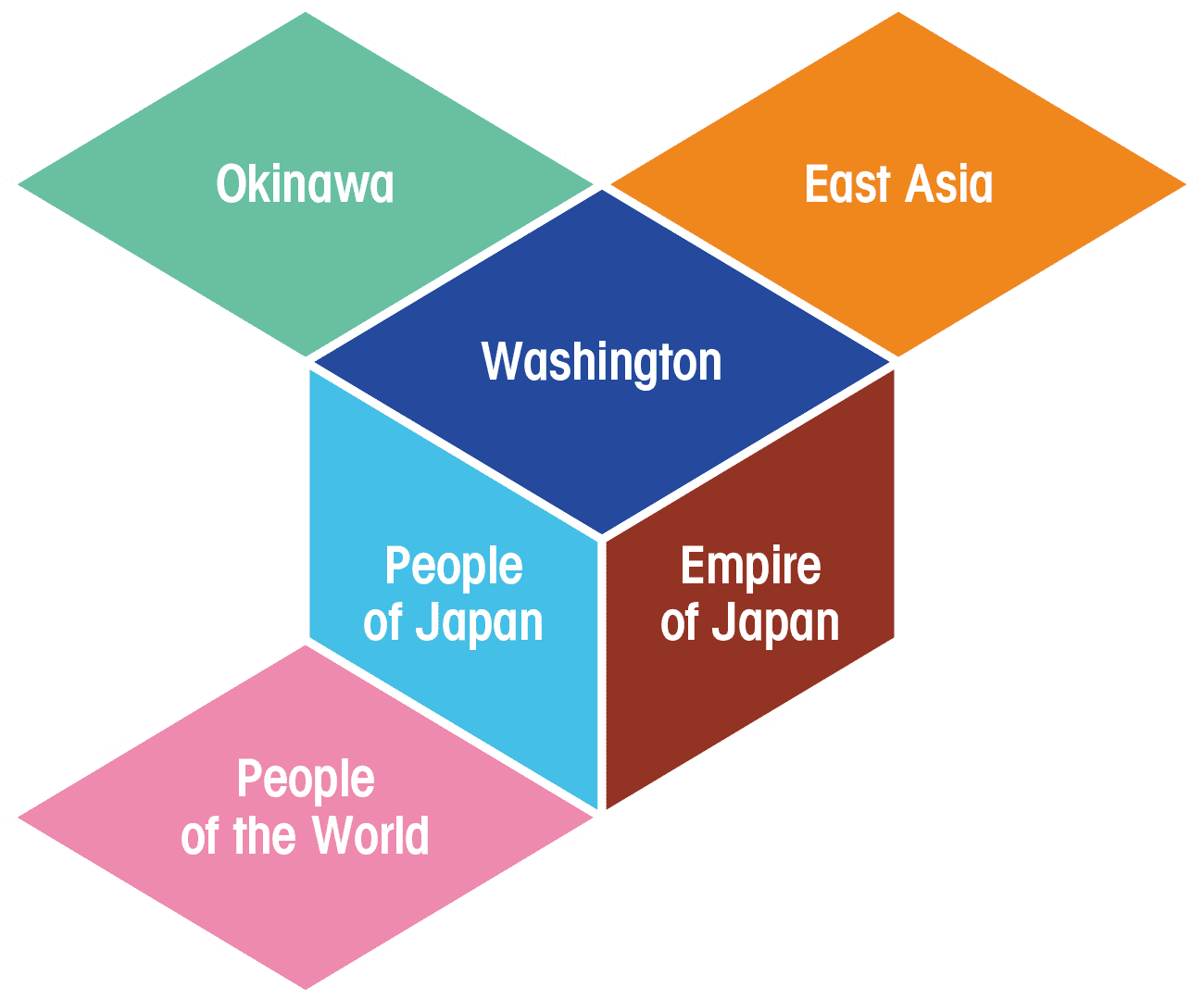
Article 9 of the Japanese Constitution means different things to different groups of people. Washington, the Empire of Japan, the people of Japan, Okinawa, East Asia, and the people of the world. From the different viewpoints of these six different groups, the entire picture of Article 9 of the Constitution comes into view for the first time. Article 9 is a hexahedron.
The Constitution of Japan calls for proactive action to
transform the international order
How does the world view the “pacifism” of the Constitution of Japan?
Kimijima First of all, maintaining security and creating peace while relying on military force as little as possible is a universal theme. The Constitution of Japan and Article 9 of the Constitution are not unique.
There are two types of pacifism. The first is absolute pacifism, which completely prohibits the possession or use of military force at any time. The argument that the Self-Defense Forces are unconstitutional falls under this category. The other is gradual pacifism, or pacificism, which is the belief that a change in the international order is necessary for the abolition of military force and war as a long-term goal, but allows the retention and use of military force for defense in the interim. It is my understanding that the pacifism of the Constitution of Japan is the latter type of gradual pacifism.
If the Constitution is being properly understood, it is necessary to take proactive action to transform the international order in a direction that reduces dependence on military force.

What kind of actions are required?
Kimijima Actions to reduce the role of military force in conflict resolution and the formation of order in the international community, and actions to create a system such as the “common security” in East Asia that I mentioned earlier.
“Pacifism of inaction,” such as not participating in U.S. wars and not sending JSDF troops overseas, is important, but it is not enough. I believe that the “pacifism of action” that is stated in the Preamble of the Constitution is essential for the purpose of international security, and that is the essence of the Constitution of Japan.
As an actor that plays an important role in “pacifism of action”, I pay attention to the activities of civil society represented by NGOs. Since the end of the Cold War in the 1990s, non-violent intervention in conflict by NGOs has attracted attention. They are attempts by unarmed, multinational civilian teams to enter areas experiencing humanitarian crises and work alongside local non-violent activists to act as a deterrent in the eyes of the international community and prevent massacres. I myself am involved in an NGO working to reduce the role of military force, and an NGO working to achieve common security in East Asia. The Preamble and Article 9 of the Constitution of Japan require us to take such proactive action and to cooperate with global civil society.
In my seminar, we have been holding an “East Asia Student Peace Dialogue” with students from China’s Fudan University since 2011, and with students from South Korea’s Kyung Hee University since 2018. It is a two-day event where presentations and discussions are held in English. I believe that such mutual visits of researchers and students are one of the actions that can be taken to ease tensions and prepare for peace.
For Those Interested in Pacifism in the Constitution of Japan: BOOKS
豊下 楢彦
昭和天皇の戦後日本―〈憲法・安保体制にいたる道〉
岩波書店(2015年)
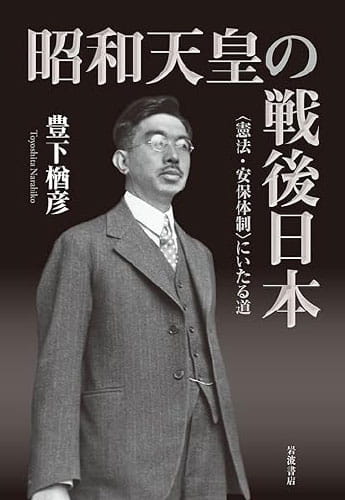
柄谷 行人
憲法の無意識
岩波新書(2016年)
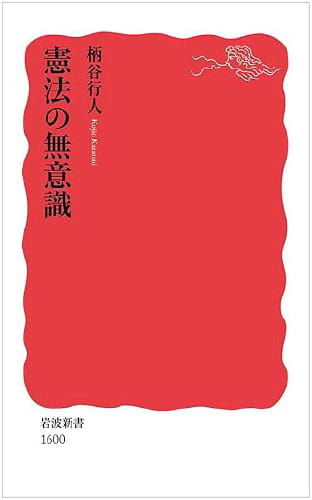
メアリー・カルドー著/山本 武彦・宮脇 昇・野崎 孝弘訳
「人間の安全保障」論
法政大学出版局(2011年)
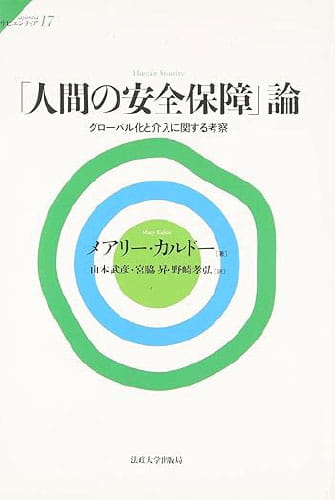
For Those Interested in Pacifism in the Constitution of Japan: FILMS
映画
クロムウェル(Cromwell)
ケン・ヒューズ監督/イギリス(1970年)
映画
ダントン(Danton)
アンジェイ・ワイダ監督/フランス、ポーランド(1983年)